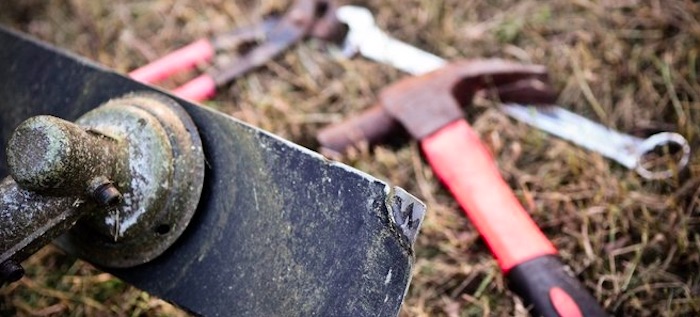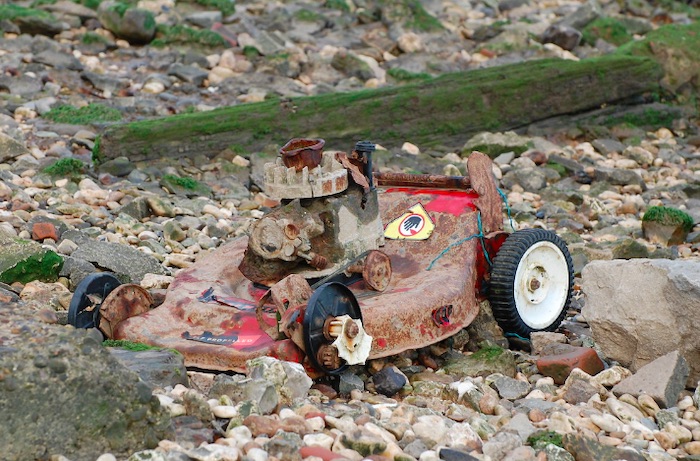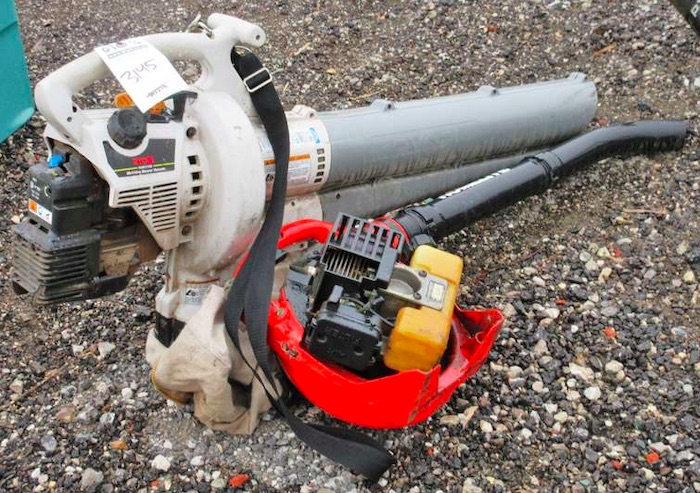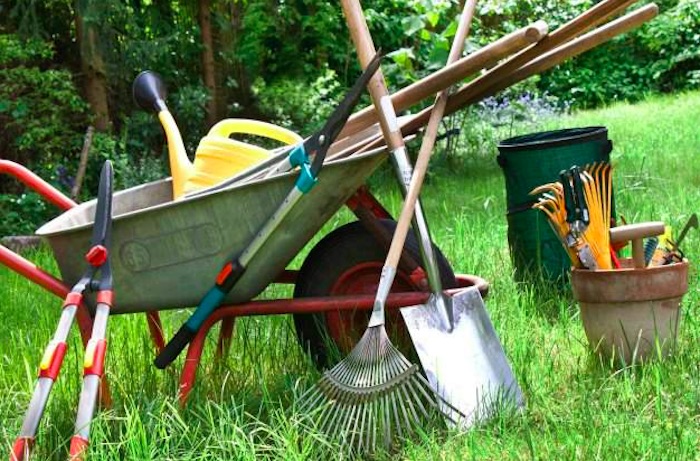
Spring has officially sprung, which means it’s time to get outside and start your spring yard work. But when you discover that your old lawnmower doesn’t crank, your old weed eater sprung a gas leak or your trusty old garden tools have broken handles and rusted heads, it’s time for them to be replaced.
So what do you do with the broken tools? With strict equipment disposal regulations for certain gas-powered machines and battery-operated tools, you can’t just toss your yard equipment in the trash or curbside recycling bin. For that reason alone, recycling your tools and equipment can be a real pain in the grass without the proper help.
We’ll walk you through how to properly assess all of your gardening equipment, and give you the best pointers for recycling old garden tools near you.
Table of Contents
**Click to auto-scroll by section
Assess Your Tools: Repair, Recycle, Donate or Dispose
Before you go rummaging through your tool shed or gardening box tossing out any tool that looks even remotely sketchy, remember that some tools only need a small, inexpensive repair to extend their life. Equipment disposal is a difficult and dirty job. By assessing your tools and lawn equipment, you’ll be able to determine what can be repaired and what needs to go.
Safety First: Before working on any of your tools, disconnect them from power source. For gas-powered tools, remove the spark plug so it doesn’t turn on, which could result in injury.
Lawn Mowers
After essentially hibernating for the last several months, lawnmowers don’t always crank the first time you try. Pumps, seals, and valves in the carburetor can get gummed up if you forgot to empty your gas tank before shoving your lawnmower into storage for the winter. And things like that can be repaired fairly easily.
You may have to prime the engine three or four times to get your lawnmower to begrudgingly turn over. But if your old lawnmower won’t start after a few cycles of priming and pulling, don’t start browsing online for new mowers just yet.
Here are some incredibly basic things you can do yourself that might get you up and running:

Troubleshooting Your Lawnmower Engine:
- Spark Plug: Before moving any further, always disconnect the spark plug. Manually turning the mower blade with the spark plug still connected could cause the engine to essentially “kick start”, and you could lose some fingers. And let’s be honest…no one wants that. While you’re at it, inspect the spark plug to make sure that it isn’t burned out. A burnt spark plug will result in an engine that doesn’t crank. Make sure to check if you need spark plug disposal help.
- Gas in the tank? Sounds silly, we know. But sometimes the issue is as simple as forgetting to put gas in the tank. After all, it’s been a while since you’ve used your mower. But if you forgot to empty the gas before putting it away for the winter, bad gas might be the issue. Try draining the tank and refilling it with clean gas.
- Air & Fuel Filters: Most mowers only use an air filter, but some have both an air and oil filter. Check your filters to see if they’re dirty. Sometimes oil can seep into the air filter, which can cause your mower not to start.
- Oil: Most mowers need an oil change every 20-50 hours of operation. Dirty oil could cause things to jam up and not turn over. Complete an oil change on your mower and try to crank it again. If that doesn’t work and you know that there is plenty of gas in the tank, it may be time to get rid of it.
If your old lawnmower still won’t turn on after checking all of these things, you might have a broken machine on your hands. If your mower is older, repairs can get costly because parts are harder to find. That’s an expense that can be pretty hard to justify when you can just get a new mower with all the bells and whistles.
Searching for old lawn mower disposal? BOOK A PICKUP ❯
Chainsaws
There are several reasons why your chainsaw may not be starting, or is not operating correctly. If you are having issues with your chainsaw, try the following:
Troubleshooting Your Chainsaw
- Chain Tension: If the chain is sagging, it can cause your chainsaw not to start. Make sure the chain is adjusted to the correct tightness. If your chain is rusted or broken, it should be replaced.
- Bar Straightness: Make sure the bar (the part the chain wraps around) is completely straight and free of dents. A bent, cracked, or broken bar might be too severely damaged to be worth repairing. Operating a damaged chainsaw is dangerous – don’t risk it. Buy a replacement and get the broken chainsaw picked up for chainsaw disposal.
- Proper Gas/Oil Mix: Chainsaws come in both two-stroke and four-stroke engine styles. You need the proper gas/oil mix for your engine type. The wrong mix, or an improper ratio of gas to oil, can cause your chainsaw not to work. If you’re using the correct fuel, your issues might be with the carburetor, which could mean it needs to be replaced.

Leaf Blowers
Over time, leaf blowers might lose power or stop blowing altogether. In some cases, blower/vacuum combos can get clogged up with bits of leaves and debris. Remove the blower nozzle and check for any debris that might be causing your blower not to start.
If everything looks clean and there are no leaves clogging the intake, the problem might be with the engine, power source, or carburetor. And unless you’re handy with fixing small engines, it’s probably more cost-effective to replace your broken leaf blower than to have it repaired, especially if it’s an older model.
A leaf blower that won’t blow leaves anymore is pretty useless and should be disposed of. Leaf blowers are often made with mixed materials that can be recycled, but they won’t be picked up from your curbside recycling bin, so it’s important to find a better disposal solution than the landfill. An eco-friendly junk removal company like LoadUp can help with that!
Leaf blower not blowing leaves? BOOK A PICKUP ❯
Weed Eaters
If your old weed eater won’t turn on, check to be sure that it’s actually getting power. If you have an electric weed eater, you might have a frayed power cord, and it’s time for a new one.
If you have a gas-powered weed eater, make sure the gas/oil mixture is correct and the tank is full. If you have a full tank of the proper fuel and your old weed eater still doesn’t work, you’ll need to dispose of it and replace it.
Weed eaters have a lot of metal and plastic components that are recyclable, but that you can’t just throw into the curbside bin.
In order to do proper weed easter disposal, you’ll need to know the steps to take, such as learning how to remove the weed eater head. Like most yard tools, those used weed eaters shouldn’t be thrown in the trash, since the landfill is not the best disposal option for any tool.

Garden Tools
Broken hand tools and chopping tools like axes and mauls are the easiest to assess because their damage is pretty obvious. Since most gardening tools are made of metal, wood or both, most of them can be recycled to help reduce landfill waste.
You can scrap metal tools, but most scrap yards have weight minimums for the loads they will accept. Some recycling centers recycle metal tools, but not all of them, so it’s important to call around first before hauling all your dirty and broken tools for recycling.
Don’t dig your broken garden tools? We do. GET QUOTE ❯
Now is also a good time to collect any hand tools that are still in good condition, but you no longer need or have decided to upgrade. You can donate garden tools to community gardens, schools, daycares, senior care homes or a local charity or thrift store.
If you don’t have time to donate garden tools or you won’t meet the minimum weight requirement to scrap metal tools, you can still dispose of them in an eco-friendly way with LoadUp! We’ll pick up your tools and equipment so you don’t have to do the difficult and time-consuming disposal work yourself!
When you hire us to haul away your garden tools, we’ll deal with all the heavy-lifting and hauling, and we’ll find the most eco-friendly disposal method available – so you can spend more time gardening!
Recycling Tools & Equipment
Did you know that you can recycle a whole lot more than just yard waste and debris? Large tools and equipment like lawnmowers, chainsaws, leaf blowers, trimmers, and edgers can be recycled, too! Since metal is a non-renewable natural resource, it’s especially important to recycle tools and equipment whenever you can.
But there’s even more to it.
Lawn care tools and equipment are often made from hazardous materials that can’t be thrown in the trash. Many states and counties have strict disposal regulations, and often require tools and other eWaste items to be recycled.
Scrap metal recycling is an important aspect of landscaping equipment disposal since it keeps valuable metal out of the landfill. But recycling tools and equipment is more complicated than everyday curbside recycling since you can’t just toss everything into your blue or green recycling bin.
Recycling tools and equipment allows your old or broken tools to be melted down and used to manufacture new tools and equipment, which reduces your carbon footprint by eliminating the need for mining new materials.
Scrap metal recycling facilities will break down your old landscaping equipment, separate the plastic from the metal, remove all traces of gasoline and lubricants, and then melt down the metal for reuse.

Hiring the Right Equipment Disposal Company
LoadUp offers a safe and eco-friendly way to dispose of all your broken or unwanted landscaping tools without having to do any of the legwork yourself. We work with local recycling facilities and donation centers across the country to keep as much of your lawn tools, landscaping equipment and other unwanted junk out of your local landfills as possible.
With flexible pickup options and upfront guaranteed prices that are 20-30% lower than most other junk removal companies, LoadUp provides a better, greener way to dispose of any and all of your unwanted junk at your convenience.
When you want the most affordable and eco-friendly junk removal service, call on the lawn equipment disposal professionals at LoadUp. Get your no-obligation, guaranteed quote online, or give us a call at (844) 239-7711 to find out more about what makes us your best option for tool recycling and equipment disposal today!
Related Articles from the Trash Talk Blog:

